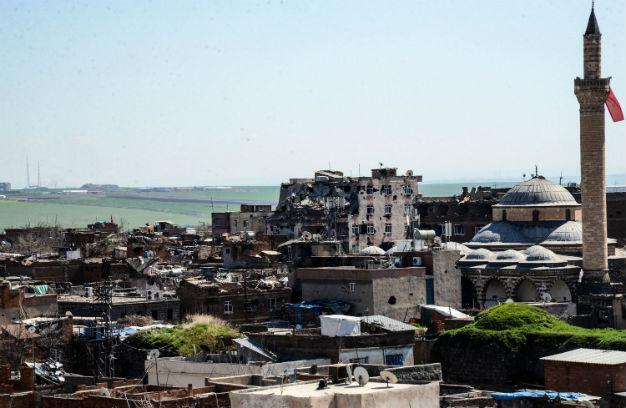Turkey invites UN to visit southeast amid claims of rights abuses
ANKARA

AFP photo
Turkey has offered an open invitation to U.N. agencies to visit the country’s southeastern provinces after reports of human rights violations allegedly committed by Turkish security forces in the region in the past few months, while Ankara has strictly refuted a statement by the top U.N. rights official that it has not responded positively to previous requests from the U.N. to visit the region.
U.N. Commissioner for Human Rights Zeid Ra’ad al-Hussein said on May 10 that he had received a succession of alarming reports about violations allegedly committed by Turkish military and security forces in Turkey’s southeast over the past few months, and urged Turkish authorities to give independent investigators, including U.N. staff, unimpeded access to the area to verify the veracity of such reports.
Zeid underlined the actions of security forces in the Cizre district of the southeastern province of Şırnak, which has been left devastated by ongoing clashes between Turkey’s security forces and outlawed Kurdistan Workers’ Party (PKK) militants, and drew particular attention to reports quoting witnesses and relatives in Cizre which suggested that more than 100 people were burned to death as they sheltered in three different basements surrounded by security forces.
“The Turkish government has not responded positively to requests by my office and other parts of the United Nations to visit the region to collect information first-hand,” Zeid said, while noting that “all these allegations, including those leveled at the groups fighting against the security forces, are extremely serious and should be thoroughly investigated, but do not appear to have been so far.”
However, Ankara has refuted those statements, saying they were “based on insufficient information” and “did not reflect the spirit of cooperation” between Turkey and the U.N. in the field of human rights.
“It is not possible to accept Zeid’s expressions suggesting that requests by U.N. units to visit our Southeastern Anatolia region have not been responded to positively,” Foreign Ministry Spokesperson Tanju Bilgiç said in a written statement released late on May 10.
Bilgiç’s statement came in the form of an official answer to a journalist’s question.
“It is thought that High Commissioner Zeid’s statements, which do not reflect the spirit of cooperation between Turkey and the U.N. in the field of human rights, are based on insufficient information and misdirection of biased circles. In case he wishes, we would be pleased to host Mr. Zeid in our country in a way that would cover our Southeastern Anatolia region too,” Bilgiç said.
In his statement, the top U.N. human rights official put particular emphasis on information emerging from a variety of credible sources about the actions of security forces in Cizre.
Cizre and claims of civilians ‘burnt to death’
“I strongly condemn violence and other unlawful acts committed by the youth groups and other non-state agents, allegedly affiliated with the PKK, in Cizre and other areas, and I regret any loss of life as a result of terrorist acts wherever they have occurred,” Zeid said. “However, while Turkey has a duty to protect its population from acts of violence, it is essential that the authorities respect human rights at all times while undertaking security or counter-terrorism operations – and international law prohibiting torture, extrajudicial killings, disproportionate use of lethal force and arbitrary detention must be observed.”
The high commissioner said he had received reports of unarmed civilians – including women and children – being deliberately shot by snipers, or by gunfire from tanks and other military vehicles.
“Most disturbing of all are the reports quoting witnesses and relatives in Cizre which suggest that more than 100 people were burned to death as they sheltered in three different basements that had been surrounded by security forces,” Zeid said. “All these allegations, including those leveled at the groups fighting against the security forces, are extremely serious and should be thoroughly investigated, but do not appear to have been so far,” he added.
Call to declare Cizre and other conflict zones ‘disaster areas’
A round-the-clock curfew in Cizre was in place for more than two months to conduct military raids on homes and shelters used by militants. The curfew, which came into effect on Dec. 14, 2015, has been limited to half-days (between the hours of 7 p.m. and 5 a.m.) since March 2.
The previous, months-long curfew subjected local residents to power blackouts, food and water shortages and destroyed neighborhoods. Fierce clashes between PKK militants and security forces also halted education and health services in the towns placed under curfew.
In early May, the country’s main opposition party said Cizre and all other zones of conflict should immediately be declared “disaster areas.”
“Cizre should swiftly be taken in the scope of a disaster area and all the conflict zones in the region should be assessed within the same scope,” a delegation from the main opposition Republican People’s Party (CHP) said in a report released on May 2.
